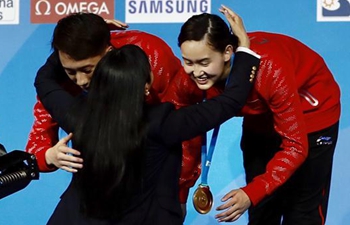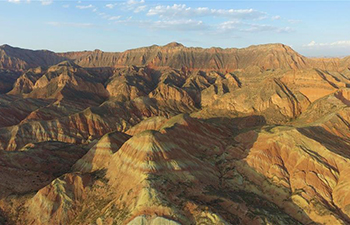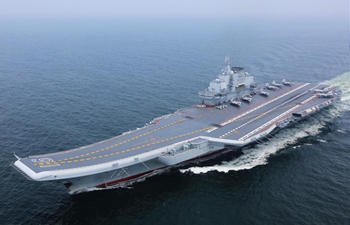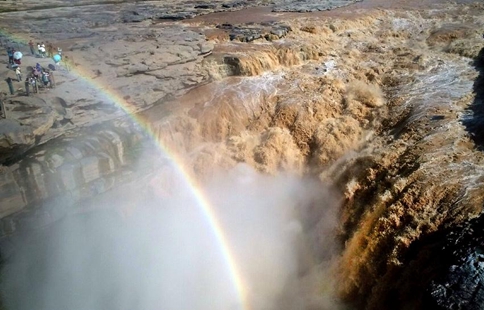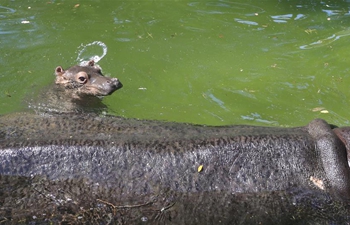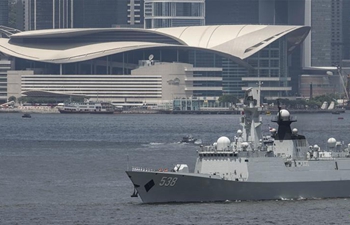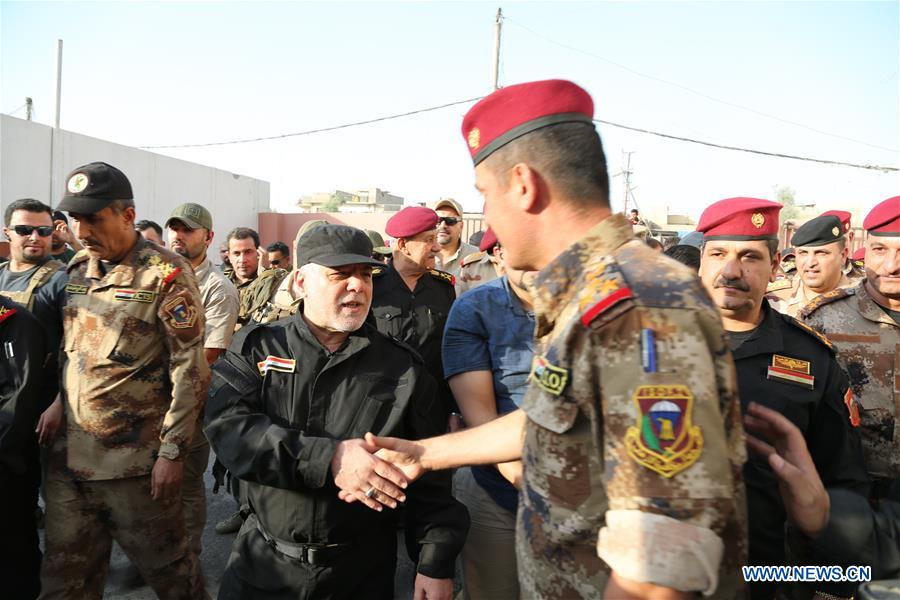
Iraqi Prime Minister Haider al-Abadi shakes hands with a military officer before a celebration for liberation of Mosul in Mosul, Iraq, July 10, 2017. Haider al-Abadi on Monday formally declared Mosul liberated from Islamic State (IS) militant group after nine months of fierce fighting to dislodge the extremist militants from their last major stronghold in Iraq. (Xinhua/Khalil Dawood)
by Jamal Hashim
BAGHDAD, July 15 (Xinhua) -- Iraq needs careful and wise plan to deal with division among factions and ensure lasting stability, as post-Islamic State (IS) stage came after Iraqi Prime Minister Haider al-Abadi declared historical victory over IS in Mosul, experts said.
Despite the landmark victory, the Iraqi forces still have to wage a new offensive to liberate less important IS redoubts.
Abadi formally declared Mosul liberated from IS on Monday after nearly nine months of fierce fighting to dislodge the extremist militants from their last major stronghold in Mosul, Iraq's second largest city.
However, the military prevail is still not gained in southwestern Kirkuk, the adjacent sprawling rugged areas in eastern Salahudin province, in addition to the remaining IS strongholds in the border towns with Syria, including Aana, Rawa, and al-Qaim.
Besides, there is a risk that the Iraqi factions, who united in front of battle against IS group, would fight each other for the spoils or their old arguments after IS was defeated.
Najib al-Jubouri, an Iraqi political expert, related the division to the U.S.-led invasion of Iraq in 2003, saying that the invasion has substantially decimated the fabric of the Iraqi society, sparking hatred and deep division among Iraqis.
"The occupation empowered some Iraqi factions and disenfranchised others, making co-existence among Iraqis difficult and sometimes almost impossible," he said, referring to the factions of the Iraqi security forces, predominantly Shiite paramilitary Hashd Shaabi units, Kurdish Peshmerga forces and Sunni tribal fighters.
The Kurds took advantage of the collapse of the Iraqi security forces against IS in June 2014. It took control of large swaths of territories and named disputed areas outside their semi-autonomous region in northern Iraq. For the Kurds, the seized areas are hard to voluntarily abandon.
As for the Sunni Arab community, who are overwhelmingly relief for the liberation of their territories from IS militants, there is also fears about the Shiite-led government and the future.
The Sunnis believe that Baghdad Shiite-led government has long been ignoring complaints of the Sunni community, Jubouri said. "They also accuse the Shiite-dominated security forces and Iranian-backed militias of indiscriminately arresting, torturing and killing their sons," he added.
"Such complaints are very serious. Whether they were true, or partially true, the angry Sunnis went into more than a-year-long demonstrations and sit-in protests against the former Shiite Prime Minister Nuri al-Maliki, who responded to the Sunni demands by storming their sit-in camps in Hawijah and Ramadi, sparking fierce armed conflict and bloodshed. Such policy by Maliki was a perfect opportunity for the extremist groups, including IS, to thrive," he said.
In the wake of widespread destruction and allegations of abuses, the Iraqi government should work on approaches to regain the trust of the Sunni Arabs and bring them back effectively to the political process, thus preventing the re-emergence of violent extremism.
It would be ideal to keep the unity of all Iraqi factions against IS militants, and make it strong enough to continue to forge a national identity that would make all Iraqi factions follow the best interests of all the people of Iraq rather than their own parties.
It requires careful and wise planning "to deal with the political and social division among the Iraqi factions, mainly the major factions Kurds and Sunni Arabs," said Jubouri.
"There is also a need for coordination between the Iraqi government, neighboring countries and the international community in order to curb the interventions that fuel the struggle inside Iraq," Jubouri added.
Sheikh Ahmed al-Safi, representative of Iraq's most revered Shiite cleric Ayatollah Ali al-Sistani, conveyed on Friday Sistani's advice to the political leaders to plan carefully for the post-IS stage.
"Everyone should be aware that resorting to violence, oppression and sectarian provocation would only lead to more bloodshed and destruction of the country, and would open the door wide for regional and international interventions," Safi said in the weekly Friday prayer in the holy Shiite city of Karbala.
Meanwhile, Abbas al-Baiyati, a Turkoman Shiite lawmaker said in an interview with Iraqi local television that the failure of the post-invasion governments to meet their citizens' economic and security needs had created conditions for the terrorist group to thrive, as well as continued infighting and corrupting inside the government.
Therefore, there is a need for a change in the political rhetoric of the government and the politicians as well to be more inclusive to all Iraqi factions, he said.
"There is also a need for the next general elections to change the politicians and for the political entities to adopt national rhetoric in their election campaigns and dismiss the factional attitudes," Baiyati added.
"Since the regime change in 2003, Iraq has failed to build a stable and pluralistic state, but with IS group is on the run elsewhere in Iraq after the great victory in Mosul, Iraqis should seize the opportunity to give life to the political process and give themselves peace after years of chaos and bloodshed," Jubouri concluded.




